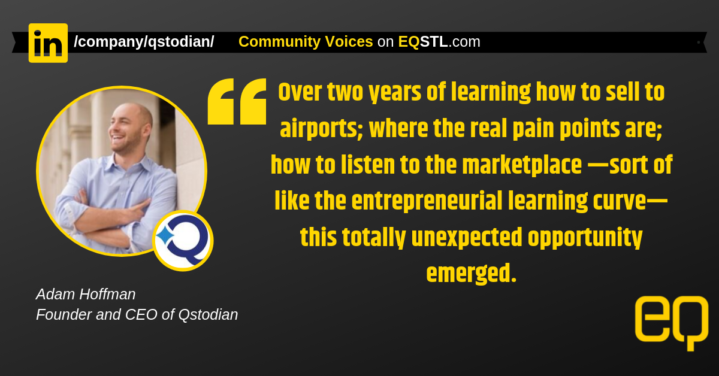
CheckTheQ Pivots Product, Re-brands as Qstodian After Actively Listening to Customers
The ChecktheQ team’s original focus was on wait-time tracking in large venues such as airports or stadiums. But it was conversations with their founding clientele that led them to discover an almost invisible and unmet need within the industry: custodial services management.
CheckTheQ, a startup known to EQ readers for claiming prizes at OPO’s startup pitch day, Startup Connection, and going through Capital Innovators and Arch Grants, has pivoted their product and re-branded their company.
The new company, Qstodian, re-purposes its sensor-based technology into a real-time custodial workforce management solution. They’re starting with the problem of restroom cleanliness.
Pivoting their technology stack towards a unique building and facilities management solution is a big and brave change for the founding team. Their combination of software and hardware, which was previously designed for tracking and predicting security line wait times at airports, has now been adapted to monitor restroom traffic patterns in real-time and shorten response times to any issues that arise.
I spoke with Adam Hoffman, CEO of Qstodian, by phone to get the whys and wherefores of the decision.
“I struggled a lot as an entrepreneur in my early 20s asking myself, is it better to go work a conventional job for a bunch of years, and then maybe pursue entrepreneurship after establishing that knowledge base? Or is it better to dive right in? A lot of smart people disagree on that issue.”
With an original idea for wait line monitoring, Hoffman chose to dive right in. As it goes for many startups, even when the primary concept gains traction, the foundation of the business may ultimately rest elsewhere.
CheckTheQ was the first business I started and it had first time entrepreneur written all over it… I hated waiting in line at airports. I thought, “I know other people have this problem.” Airports don’t like it either, thus there must be a viable business here.
He was alluding to the fact that, with Qstodian, he was now leaning more towards customer-centricity over big ideas.
You might also like:
Pivoting Into Product Market Fit
Hoffman explained that CheckTheQ was a great vehicle for cutting his teeth in an established industry.
“So what I found is that our biggest shot at success, yet —our biggest opportunity— has really come from learning by doing and learning how to listen too. I think that was a skill that I really critically undervalued; going in as a 22-year-old who was “trying to beat the world.”
Turns out that people who have been working in this industry for 60 years, or 40 years or even 10 years, know it really well and know their problems. And so a willingness to listen to them has ended up serving us really well so far.”
Pivoting Arises From Active Listening
What I also admire about the decision to pivot, is that the move was in response to the actual needs of their customers, discovered through the sales and onboarding process. CheckTheQ’s customer engagement process led to important and unexpected discoveries that became the foundation for Qstodian.
“Over two years of learning how to sell to airports; where the real pain points are; how to listen to the marketplace —sort of like the entrepreneurial learning curve— this totally unexpected opportunity emerged. It turns out that there’s actually a far larger problem here.
And it’s an issue that is a little more invisible than security lines and the anxiety of getting your flight or not. It’s how do people manage cleaning schedules and custodial work?”
Pivoting Arises From Active Listening
Talking to Hoffman, I was struck by how the decision to pivot —if you’ll excuse the pun— “smells right.” It’s got the whiff of exactly the types of critical assessments startups have to make about their strategic direction all the time.
“It definitely feels like we sort of found cousins, you know? They’re not exactly the same,” said Hoffman, explaining how the purpose of the existing technology could be adapted.
“Like, these aren’t twin issues: ‘wait times’ versus ‘how clean spaces are and when people last cleaned them,’ but they definitely are in the same family of issues that impact day to day operations. And so being able to leverage some of the technology we have already developed helps a lot.”
Pivoting Is Sensible
While pivoting to custodial workforce management may seem unglamorous, the most hard-nosed investors will tell you that the most promising opportunities often lie in “boring businesses.” In investor circles, ‘unsexy’ or ‘boring’ is often code for ‘smart.’
It’s a shorthand way of explaining that this startup looked for opportunities where no one else was looking. And Qstodian seems to have identified a sector that has yet to be disrupted by Internet of Things (IoT) technology and big data.
“It’s super unsexy, a perfect example of something that never would have come up in a college course when I was at Wash U, you know? The only way to discover these unsexy opportunities, I think, is to literally be working in the industry, and listen to people.
We think we have found an industry that has largely gone untouched by the data-driven transformation that is affecting so much. And we think there’s a huge opportunity here. And that’s why we’ve pushed all our chips in on it.”
Pivoting takes guts. The further down the road you are in your startup journey, the more guts it takes.
But it is also the essential advantage that startups have in any industry. It was inspiring to learn how the team at Qstodian didn’t take their advantages for granted; instead, incorporating them into a new venture.
Meet Qstodian: The ChecktheQ team’s original focus was on wait-time tracking in large venues such as airports or stadiums. But conversations with their founding clientele led them to discover an almost invisible and unmet need within the industry: custodial services management. pic.twitter.com/ZmTPYvFnjj
— Entrepreneur Quarterly (@eqstl) September 17, 2019
